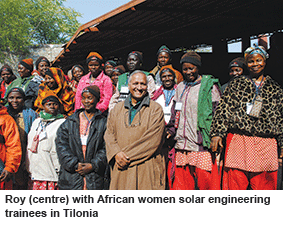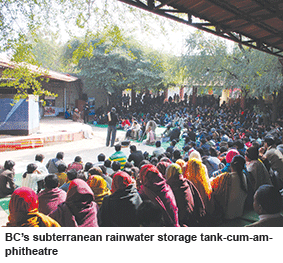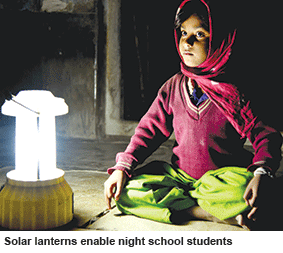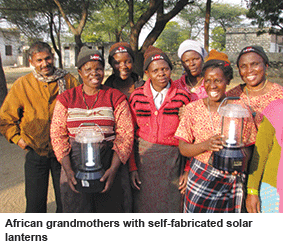Barefoot College, Tilonia
Four decades after commencing operations, BC has transformed into a model rural community college whose unique home-grown livelihood and rural employment generation programmes have spread to 14 states of the Indian Union and 72 countries worldwide: Dilip Thakore
 THE NEWLY CONSTRUCTED, STRAIGHT-AS-an-arrow four-lane National Highway No.8 which links Jaipur, the admin capital of the western India desert state of Rajasthan (pop.69 million), with New Delhi via Ajmer, is a marvel of engineering. It takes a mere 80 minutes to zip down the highway to Patan, a small town and point of departure into the scrub and gravel roads of rural India, one of which leads to the village of Tilonia (pop.4,000).
THE NEWLY CONSTRUCTED, STRAIGHT-AS-an-arrow four-lane National Highway No.8 which links Jaipur, the admin capital of the western India desert state of Rajasthan (pop.69 million), with New Delhi via Ajmer, is a marvel of engineering. It takes a mere 80 minutes to zip down the highway to Patan, a small town and point of departure into the scrub and gravel roads of rural India, one of which leads to the village of Tilonia (pop.4,000).
Here, four decades ago the Social Work and Research Centre (SWRC) was modestly promoted by the then 25-year-old Sanjit (‘Bunker’) Roy in 1972. Over the past 44 years, SWRC has transformed into the globally acclaimed Barefoot College — perhaps the only village-based community college worldwide — whose organic rural education and development model offers the hope of breaking the grinding cycle of rural illiteracy, apathy and poverty which has sentenced over 600 million residents of village India — and several multiples of that number in other developing nations of the third world — to lives of perpetual want, hopelessness and despair.
Today, forty years after its initial tentative operations, BC is not only a model rural community college engaged in transforming illiterate villagers of both sexes into solar power and rainwater harvesting engineers and educators, it’s also the hub of primary healthcare and vocational education whose unique, home-grown livelihood and rural employment generation imprint has spread to 14 states of the Indian Union and to 72 developing countries worldwide.
“BC is the only college worldwide which consciously follows the teaching, life and work style of Mahatma Gandhi, who envisioned an India comprising thousands of self-sustaining village republics. Here, we don’t accept that village farmers, artisans and service providers are uneducated even if they are illiterate. On the contrary, we believe most village folk are well educated in inherited traditions of crafts, water management, weather forecasting and agriculture know-how and survival which are thousands of years old. In BC, our objective has been to revisit education by reviving the native skills of village India to tangibly improve people’s lives by enabling them to generate solar energy, manage water resources and build capacity for sustained development,” Roy informed EducationWorld which wrote the country’s first detailed feature (February 2012) on this sui generis learning institution which, although celebrated around the world, has been curiously neglected by the Indian media and establishment.
envisioned an India comprising thousands of self-sustaining village republics. Here, we don’t accept that village farmers, artisans and service providers are uneducated even if they are illiterate. On the contrary, we believe most village folk are well educated in inherited traditions of crafts, water management, weather forecasting and agriculture know-how and survival which are thousands of years old. In BC, our objective has been to revisit education by reviving the native skills of village India to tangibly improve people’s lives by enabling them to generate solar energy, manage water resources and build capacity for sustained development,” Roy informed EducationWorld which wrote the country’s first detailed feature (February 2012) on this sui generis learning institution which, although celebrated around the world, has been curiously neglected by the Indian media and establishment.
Jesse Hartigan, an American academic, who visited BC in 2007, offers an explanation. Writing in Innovations — Technology, Governance and Globalisation, a journal of the Massachusetts Institute of Technology, he says: “Those most hostile to the Barefoot approach are people who have invested a great deal in acquiring an education through the official system and then applying their misguided ‘expertise’. The very idea of semi-literate women being able to manage and control initiatives at the village level, undermines those hard-earned credentials and credibility, and even threatens the existence of their jobs. Indeed, one result of the Barefoot approach in India where it is most widely replicated, has been replacement of cost-intensive initiatives by low-cost and labour intensive initiatives, providing gainful employment within villages.”
 Although ill-informed critics often dismiss Barefoot College as a one-off, unscalable wonder driven by Roy’s powerful personality, the under-publicised reality is that the BC model is being replicated with varying degrees of success in 14 states across the country. In 1993, the Barefoot College management comprising a cabal of barefoot engineers, managers and communicators promoted the college’s nationwide initiative under which BC-trained solar engineers, rainwater harvesters and other skilled individuals are encouraged to establish BC replicas in other states. The Society for Activating, Motivating, and Promoting Development Alternatives (SAMPDA) has spawned 23 similar organisations spread across 14 states.
Although ill-informed critics often dismiss Barefoot College as a one-off, unscalable wonder driven by Roy’s powerful personality, the under-publicised reality is that the BC model is being replicated with varying degrees of success in 14 states across the country. In 1993, the Barefoot College management comprising a cabal of barefoot engineers, managers and communicators promoted the college’s nationwide initiative under which BC-trained solar engineers, rainwater harvesters and other skilled individuals are encouraged to establish BC replicas in other states. The Society for Activating, Motivating, and Promoting Development Alternatives (SAMPDA) has spawned 23 similar organisations spread across 14 states.
Barefoot college’s development impact
Rainwater harvesting
- 3,000 hand pumps installed to provide safe drinking water to 1.5 million people in several states ranging from the cold deserts of Ladakh (Jammu & Kashmir) to the hot deserts of Rajasthan by SAMPDA member institutions.
- Over the past two decades, Barefoot College-trained engineers, rainwater harvesters and other professionals have established BC-inspired NGOs in 13 states countrywide which train and support village solar engineers, rainwater harvesters etc.
- 1,000 BC-trained hand pump mechanics repair hand pumps in 764 villages in seven states of India.
- 10 billion litres of rainwater collected from the roofs of 1,600 schools in 900 villages of 18 states of the Indian Union to provide drinking and sanitation water to 500,000 children.
- 30 billion litres of rainwater collected in 24 small dams has revitalised 130 village tanks and 1,500 hand pumps to provide women and children access to clean water close to their homes.
Health, education and advocacy
- Since 2004, Barefoot College has trained over 250 barefoot doctors, 650 midwives, 15 pathologists, women dentists,
 water chemists, surveyors, women solar cooker engineers, communicators and computer operators who have serviced 1.8 million people in Tilonia and neighbouring districts.
water chemists, surveyors, women solar cooker engineers, communicators and computer operators who have serviced 1.8 million people in Tilonia and neighbouring districts. - Solar-lit night schools have been established in 850 villages of Rajasthan with 3,140 barefoot teachers providing primary education to 25,000 children going to school for the first time. “Because they have to tend livestock, fetch firewood and water, they cannot attend traditional day schools,” says Teja Ram, a member of Barefoot College’s core committee who supervises the night schools division.
- Over 900 traditional communicators trained in street theatre, puppet shows etc communicate social messages to over 100,000 people in remote villages unserved by newspapers and television.
Rural livelihoods
- Barefoot College directly provides employment in the college and retail outlets to 1,850 rural artisans — weavers, leather workers and other craftsmen — through the Barefoot Shop sited on the BC campus in Tilonia and in Patan, 7 km from Tilonia. Cumulative earnings aggregating $200,000 (Rs.1.36 crore) have been paid through cheques so recipients learn how to read and write to operate bank accounts.
- The SAMPDA network provides employment to 800 barefoot architects trained to design and construct low-cost homes, training centres, school buildings, toilets, rainwater harvesting tanks and geodesic domes.
- Inside BC, Tilonia, 160 physically challenged men and women are gainfully employed producing toys, sanitary napkins and solar cookers for sale and for managing a community radio, puppet shows etc which reach progressive social messages to over 150,000 people in Tilonia and neighbouring districts.
Global impact
Currently, 40 illiterate rural women from ten developing countries are undergoing six months training in Tilonia to transform into barefoot solar engineers. This programme introduced in 2005, has thus far trained over 750 women from 78 developing countries including Kenya, Zambia, Sierra Leone, Chad and Burkina Faso (36 countries in Africa) as also women from Colombia, Jordan, Guatemala and Peru among others, under BC’s unique GWBSE (grandmother women barefoot solar engineers) programme. This free-of-charge programme funded by the Union ministry of external affairs, is restricted to grandmothers because according to Roy, they are unlikely to migrate from their villages.
“During their stay here, grandmothers from abroad are thoroughly trained not only to fabricate, install and repair electronic circuits — which contain 35 components — but also to connect them with bought-out solar panels and storage batteries and install and maintain integrated solar energy units in their villages back home,” says Bhagwat Nandan, a member of BC’s core committee and head of the college’s solar energy unit.














Add comment